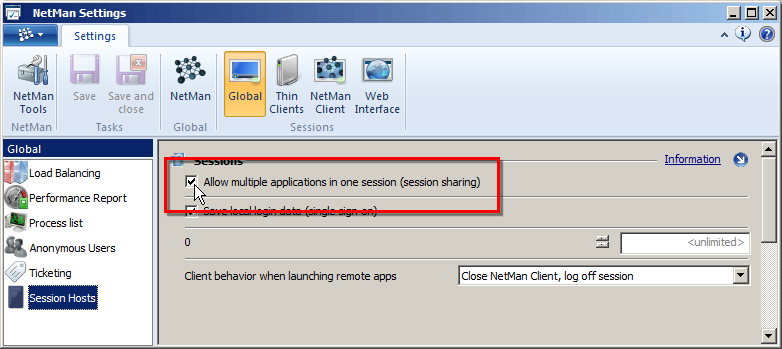Generally, when a user opens multiple applications, each one is opened in a separate Remote Desktop session on a Session Host. This means each application runs in its own Windows environment, even if they were all called by a single user. This can be a heavy burden on the server's resources. The load would be reduced considerably if all the applications were launched in the same session that the user initially opened. This session sharing functionality is enabled by NetMan Desktop Manager. Prerequisite for session sharing is that application sessions run in "Seamless Windows" mode.
To activate the Session Sharing feature, select the Global section of the NetMan Settings, open the Session Hosts page, and tick the box next to Allow multiple applications in one session (session sharing):

![]() The following points are important to keep in mind when you configure NetMan Desktop Manager session sharing:
The following points are important to keep in mind when you configure NetMan Desktop Manager session sharing:
•The applications must execute in "Seamless Windows" mode. If an application is configured to open in a separate window, it will open in a separate session.
•The applications must all have mutually compatible window and audio settings. For example, if sound support is activated for one application but deactivated for another, the web service will open those two applications in two separate sessions.
•For Remote Desktop sessions, each application must be opened using the same login credentials.
This means session sharing requires one of the following launch methods:
•Use local login data
•One-time login over NetMan Desktop Client
•Use login data from web interface
•Define login data here
Session sharing will not work in sessions opened using the following launch methods:
•Interactive login per session (without further specification)
•Use NetMan anonymous users
![]() When an application is opened in an existing session, the Startup Script is not executed; only the NetMan Script is executed in the session.
When an application is opened in an existing session, the Startup Script is not executed; only the NetMan Script is executed in the session.
![]() For applications that require exclusive access to a particular resource (such as a virtual CD-ROM drive), session sharing can be a disadvantage. We strongly recommend configuring settings which will ensure that such applications run in separate sessions, for example by configuring anonymous users or block IDs.
For applications that require exclusive access to a particular resource (such as a virtual CD-ROM drive), session sharing can be a disadvantage. We strongly recommend configuring settings which will ensure that such applications run in separate sessions, for example by configuring anonymous users or block IDs.